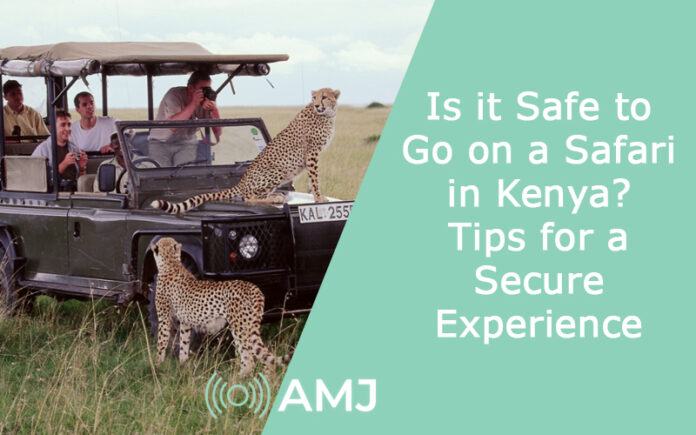Going on a safari in Kenya is an exciting and memorable experience. It offers you the opportunity to see some of the world’s most incredible wildlife in their natural habitats.
However, like any travel experience, it’s important to take safety precautions to ensure a secure and enjoyable trip. In this blog post, we’ll explore whether it’s safe to travel to Kenya for a safari tour and provide tips for a fun and secure experience.
Contents
- 1 Is it Safe to Go on a Safari in Kenya?
- 2 Tips for a Secure Safari Experience
- 2.1 1. Research Your Safari Operator and Accommodation
- 2.2 2. Follow Your Guide’s Instructions
- 2.3 3. Stay Aware of Your Surroundings
- 2.4 4. Take Precautions Against Mosquitoes
- 2.5 5. Avoid Large Crowds and Public Transportation
- 2.6 6. Stay Hydrated and Sun Safe
- 2.7 7. Be Prepared for Medical Emergencies
- 2.8 8. Respect Local Culture and Customs
- 2.9 9. Get Travel Insurance
- 3 Conclusion
Is it Safe to Go on a Safari in Kenya?
The short answer is yes, it is safe to go on a safari in Kenya.
Kenya is one of Africa’s top safari destinations, attracting millions of visitors each year.
The country’s wildlife is a major draw, including the “Big Five” (lion, leopard, elephant, rhino, and buffalo) and other species such as giraffes, zebras, and hippos.
Kenya’s national parks and game reserves are well-maintained and offer the best safari in Kenya, from budget-friendly camping trips to luxury lodges.
However, it’s important to note that as is the case with any country, Kenya is not immune to crime and security risks. The U.S. Department of State advises travelers to exercise caution when traveling to Kenya, especially in areas near the Somali border and within Nairobi.
Petty crime, such as pickpocketing and theft, is common in tourist areas and on public transportation.
However, as you will note from your Kenya safari guide, the majority of safaris take place in remote areas, away from major cities and tourist centers, which can mitigate these risks.
Tips for a Secure Safari Experience
In this Kenya safari guide, we look at some of the top tips to enhance your security and overall safari experience in Kenya
1. Research Your Safari Operator and Accommodation
Before booking a safari in Kenya, it’s important to research the safari operator and accommodation you’ll be using.
Look for reputable tour operators with positive reviews from previous travelers. Check if the operator is a member of the Kenya Association of Tour Operators, which requires members to adhere to certain standards of professionalism and safety.
Similarly, research the lodges and camps where you’ll be staying, ensuring that they are secure and well-maintained.
2. Follow Your Guide’s Instructions
Your safari guide is an expert in the area and will be able to keep you safe. Listen carefully to their instructions, especially when it comes to approaching wildlife.
Never attempt to approach or touch animals, as this can provoke them and put you at risk.
Similarly, always stay in the vehicle during game drives, as this will help keep you safe and minimize your impact on the environment.
3. Stay Aware of Your Surroundings
While on safari, it’s important to remain aware of your surroundings. Be on the lookout for any potential dangers, such as wildlife, uneven terrain, or other hazards.
Keep an eye on the weather, as rain can make roads and trails treacherous. If you’re traveling in a group, stay together and avoid wandering off on your own.
4. Take Precautions Against Mosquitoes
Kenya is a malaria-endemic country, so it’s important to take precautions against mosquito bites.
Wear long-sleeved clothing and pants, and use mosquito repellent with at least 30% DEET.
If you’re staying in lodges or camps without air conditioning, use mosquito nets while sleeping.
5. Avoid Large Crowds and Public Transportation
As mentioned earlier, petty crime is a concern in tourist areas and on public transportation.
Try to avoid large crowds and busy areas, and use private transportation when possible. If you must use public transportation, keep an eye on your belongings and be aware of your surroundings. Even if you are traveling to Kenya on a budget, small cars such as Toyota Probox, Mazda Atenza, Mazda Demio, Mark X are available for hire at just about $25-35 per day.
6. Stay Hydrated and Sun Safe
Kenya can get very hot, especially during the day. It’s important to stay hydrated and wear sunscreen to protect yourself from the sun’s harmful rays. Bring plenty of water with you on game drives, and take breaks in the shade when necessary.
7. Be Prepared for Medical Emergencies
In the event of a medical emergency on safari, it’s important to have a plan in place.
Research the nearest medical facilities before you go and bring any necessary medications or medical supplies with you.
If you’re traveling with a tour operator, make sure they have a plan in place for medical emergencies and that they have access to medical resources.
8. Respect Local Culture and Customs
Kenya has a rich and diverse culture, and it’s important to respect local customs and traditions.
Dress modestly and avoid behavior that may be considered offensive or disrespectful. If you’re unsure about local customs, ask your guide for advice.
9. Get Travel Insurance
Travel insurance is essential for any international trip, including a safari in Kenya.
For an optimal safari experience in Kenya, make sure your insurance covers medical emergencies, trip cancellation or interruption, and theft or loss of personal belongings.
If you’re participating in any high-risk activities, such as hot air balloon rides or scuba diving, make sure they’re covered by your insurance.
Conclusion
Going on a safari in Kenya can be a once-in-a-lifetime experience, but it’s important to take safety precautions to ensure a secure and enjoyable trip. By researching your safari operator and accommodation, following your guide’s instructions, staying aware of your surroundings, taking precautions against mosquitoes, avoiding large crowds and public transportation, staying hydrated and sun safe, being prepared for medical emergencies, respecting local culture and customs, and getting travel insurance, you can have a safe and unforgettable safari experience in Kenya.












![Index of Money Heist [Season 1, 2, 3 & 4 – All Episodes, Cast and Plot] Index of Money Heist](https://www.asiamediajournal.com/wp-content/uploads/2021/05/Index-of-Money-Heist-3-100x70.jpg)